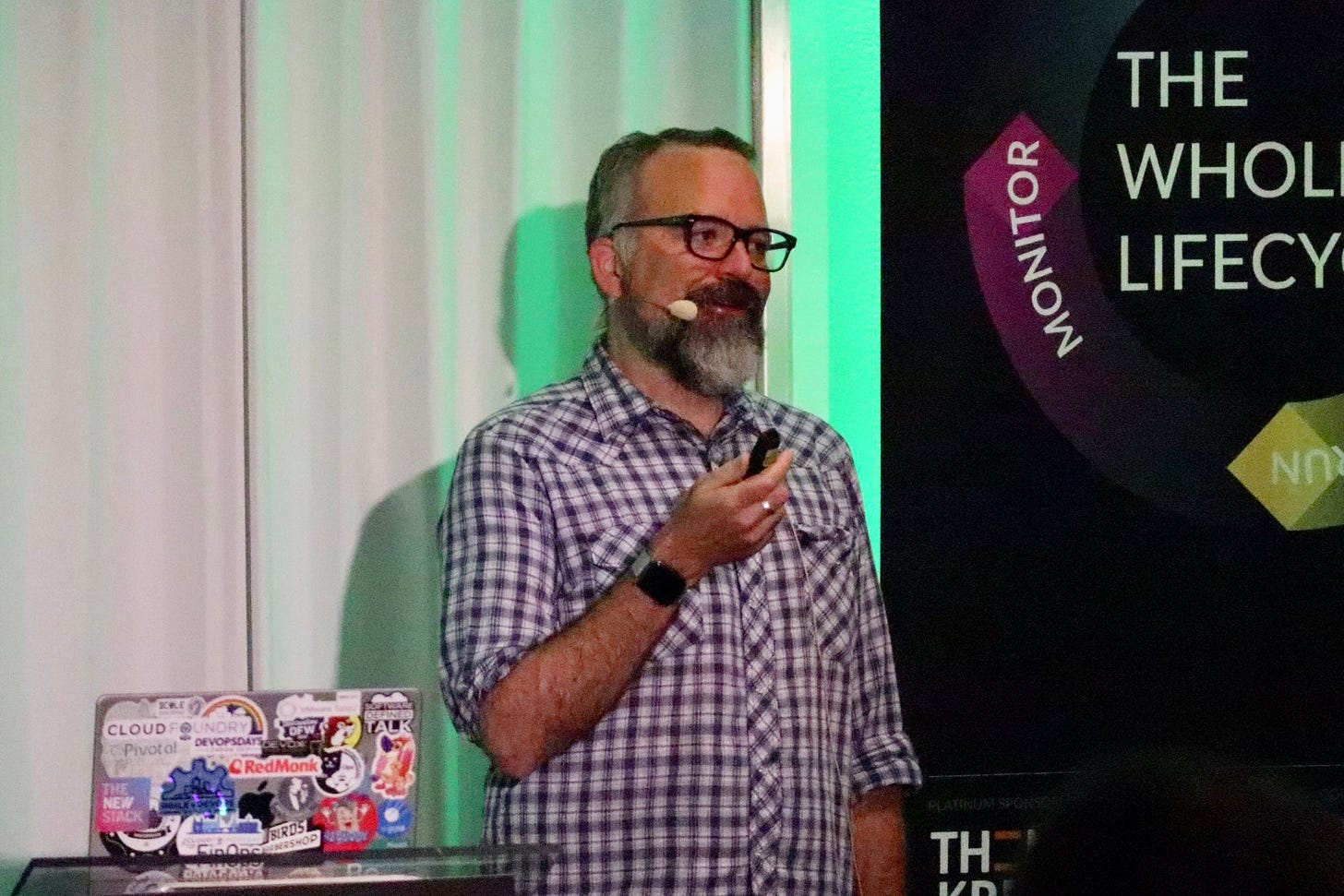Thought Leadership Hidden in Plain Sight
There’s a variation of The Plumber’s Problem that I suffer from: The Tech Marketer’s Problem.
When I see a new idea in tech bubbling up and I can smell the marketing strategy behind it (which, with my background, I usually can), I stop enjoying the, you know, story.
This becomes an anti-pattern when the idea and technology is actually good, and I grow suspicious and dismissive once I’ve smelled marketing and thought lording/ladying/theming.
Such as…
Recent examples are: Adam Jacob’s post-DevOps thought-lording (to promote how his new company does this), platform engineering (to promote Humanitec, and now all of us), and Steve Yegge on git sucking (he works at a version control company now).
In each of these cases, there are good ideas and technologies wrapped up in the marketing. DevOps did kind of drop the ball (so let’s wake it up and keep going). Now that we’re calling it “platform engineering,” the old idea of platform as a product seems to be catching on (thanks, Berlin!). And tightly integrating your dev, systems management, and infrastructure tools and stacks together can result in incredible dev and ops productivity (if can afford it).
But, with my jaundiced eyes, I have to spend a lot of effort to see past the marketing around all those great ideas.
Indeed, the best marketing is marketing a good product…but that is useless tactical advice (see most any marketing lessons learned from Apple). It’s the marketing advise equivalent of self-help and financial planning thought-leadering where the first step is “first, become a millionaire in your 20s.”
Beneficial Uses
The Tech Marketer’s Problem can be very beneficial early on in a technologies life before it has proven itself out. You can see this with Kubernetes.
Early on, even though there was a lot of interest in it, it was very, well, early. It was in the innovators and then early adopters section of the innovation curve. These are not phases of a technology that, like, a bank should get involved in…or really, any “normal” organization.
Seems like it’s fine now. (Hopefully for my bank!)
Sneak Attack on the Incumbents
However! There is a double turns out trap here: if you couple the over-hyping of a technology in the innovators and early adopters phase with an application of The Innovator’s Dilemma, you have the chance for lethal competitive surge.
Compared to the alternatives 5+ years ago, Kubernetes was under-powered and lacked a viable enterprise ecosystem. But, it was cheap!
In the developer (and DevOps-y) world, cheap means not just “low cost to free,” but it also means low friction to get started. Kubernetes was - and is - both of those. People ran around demo’ing installing Kubernetes in a 45 minute conference talk and deploying an app to it and scaling it.
All of the Day Two Operations counter-marketing in the world didn’t defuse that Day One thrill. Enterprise software is all about Day Two, where-as marketing new technologies like this is all about Day One benefits. This is a cunning use of The Innovator’s Dilemma crossed with some good marketing maneuvering.
(Docker was a better example of this: the Day One “mean time to adrenaline,” as people joked it, is quick when you start using Docker to deploy apps on your laptop. That is: trying it out is “cheap.” But, try to deploy those laptops to production in Day Two - hmmm…)
Avoiding The Tech Marketer’s Problem
I advise this:
If you are a marketer (or an executive at a tech company, or a enterprise sales rep battle worn CIO-type), be aware of this effect and catch yourself if you just automatically assume that anything in a press release or keynote talk is bullshit.
If you are part of a marketing strategy like this, very quickly go over your biases (or whatever), and focus on describing how real the technology is. “Hey, listen, I stand to benefit from the following idea because I work for a company doing it. But, just hear me out first as I explain the new idea…”
This has the added effect of nullifying your competitors hidden-marketing strategies: now the audience will be aware of the stealth-marketing technique and be wary of it.
And, look: I work in marketing. It’s like, my thing. I do all of this myself for a living. I do not think this stuff is bad or nefarious. A hammer can be used to build a house or smash a house.
Once you’re aware of a marketing tactic/effect like this, it’s just like anything else in the intricate enterprise software web of life.
Wastebook
“The audience either really likes GitHub or Fireside Metrics are broken.” That’s what podcast metric analysis is like.
“As it is free with Prime, I guess we will continue to have it.” Not the most thrilling product recommendation, but accurate.
“Slides Benedict,” from Brandon. The post Mary Meeker Master!
“If you can’t be happy with a coffee, you won’t be happy with a yacht.” Naval Ravikant, from here.
“The world doesn’t need more of what it’s got.” Here.
I’m considering replying to every email I get from procurement with “is this a joke? This must be a joke. This is not a very good joke” because, like, what are they even talking about? However, it’s always from an email address called do_not_reply@whatever, so, ok, but: I don’t think that’s how email works?
iPad Mini Update
The iPad mini continues to be good. I’m re-discovering/using Notes. As long-time readers/listeners know, I switch around my notes apps every 6 to 9 months. Notes and Bear have been in the rotation for a year or two. I like GoodNotes, but their recent version just bugs out too much with the pen - it used to be perfect! Notes is so close! I have two hang-ups:
It doesn’t use plain text files or markdown, and,
I can’t set custom background - I have scan of an old piece of graph paper that I really like using in GoodNotes.
But, Bear doesn’t do most of those either. Exporting from Notes is really terrible. Apple products are hardly ever built around the idea of batch exporting to plain text - whatever that is…uh…openness?
Anyhow.
I recently set the Lock Screen and wallpaper to Landscape with the Fall of Icarus. Action and clutter-wise, it’s one of the more boring of the Bruegel’s painting. But, once you contemplate the name of the picture and think to ask, “wait, what? I don’t see Icarus in the sky..” you look around and see that he’s all but slipped under the water after falling - look in the lower right, up and to the left a bit: legs flapping up, some feathers floating down.
Meanwhile, you see the farmer and the shepherd in the foreground, both of them seemingly unaware of the fall of Icarus. The farmer is busy doing some real, normal shit. The shepherd is just staring off into the distance, away from where Icarus fell.
This feels like the multi-year shift I’m trying to have in my life: I’ll let the younger of you out there try to fly into the sky, now. I’m content to just till the fields, or, better, zone out amongst the sheep.
As with all good paintings, there’s an alternate interpretation, as explained by Wikipedia:
The shepherd gazing into the air, away from the ship, may be explained by another version of the composition (see below); in the original work there was probably also a figure of Daedalus in the sky to the left, at which he stares. There is also a Flemish proverb (of the sort imaged in other works by Bruegel): “And the farmer continued to plough…” (“En de boer … hij ploegde voort”) pointing out the ignorance of people to fellow men’s suffering. The painting may, as Auden’s poem suggests, depict humankind’s indifference to suffering by highlighting the ordinary events which continue to occur, despite the unobserved death of Icarus.
Interpret as you will shall be the whole of the law.
Relevant to your interests
The story of platform engineering - Straight outta Berlin.
iOS 17 Notes and Reminders Features - MacRumors - Hmmm! I think he only lacking for me is no custom background on Notes. Reminders might finally be good enough for project management? I think you could do some Kanban with the column view.
The Fight to Repair - GPL thinking finally goes mainstream, eh?
B612 – The font family - Font made for readability in cockpits.
Stone Knives and Bear Skins - “When I attempted to debug the problem, I found that, unlike the tools I am used to in application development, the ones used to debug an OS are primitive at best. In comparison to my IDE and its tooling, the tools I had on hand to continue debugging had more in common with stone knives and bear skins than with modern software.”
Microsoft Cloud hiring to “implement global small modular reactor and microreactor” strategy to power data centers - I’m sure this is something much less than “Microsoft to build it’s own mini-reactor,” but if still (and even more so if it is that): I don’t man, is this how capitalism is supposed to work? What’s next, Microsoft making servers?
CNCF Survey Surfaces Cloud-Native Training CNCF Survey Surfaces Cloud-Native Training Conundrum - Skills are always a problem, IT staff is too expensive to hire, but do we spend a comparatively small amount of time and money to train people. No. // ’A global survey of 135 contributors published this week by the Cloud Native Computing Foundation (CNCF) found more than half worked for organizations that don’t pay for training (53%), with slightly less (52%) also noting their organization doesn’t give them the time to pursue certification and training…. About 81% of respondents said cost prevented them from completing certifications in the past two years, while 43% cited time as a limiting factor. Cost and time were the top two constraints for training, selected by 62% and 36% respectively.’
Confessions of a Viral AI Writer - An intriguing strategy thought in here: what if the AI writing tools are not for The Writers, but the readers. Readers are able to make good enough (or great!) stories on their own. You could say this cuts out the writers, but maybe it just means readers have more to read. Or it cuts out and guts the human writers. Technology!
Should You Measure Developer Productivity? - I should read this in more detail, but, I think the answer is “yes, just don’t be a dumb shit.” That McKinsey PDF really got the danders up! Coté’s Metrics Law: the only people who don’t want to be measured are the people being measured.
ChatGPT & Friends: The Cool Kids boosting my productivity - Om’s toolchain for people who think in text.
3 questions to get unstuck and start making progress - 1. What haven’t I done yet? Why? 2. What’s stopping me from doing this? 3. What is making me frustrated or discontent?
Upcoming
Talks I’ll be giving, places I’ll be, things I’ll be doing, etc.
Oct 3rd Enterprise DevOps Techcon, Utrecht, speaking. Oct 5th to 6th Monktoberfest, Portland, ME. Oct 9th Spring Tour Amsterdam Oct 10th, 17th, 24th talk series: Building a Path to Production: A Guide for Managers and Leaders in Platform Engineering Nov 6th to 9th VMware Explore in Barcelona, speaking (twice!).
Logoff
As you can see above, a lot going on next week. Plus, this week I’m try to work on those webinars.
Today I took about half the day off due to one of those mysterious "is it a cold? is it a flu? is it just allergies? or am i just being lazy?" sickness-episode. My dad raised me with the mantra “you don’t get sick, you have a strong constitution.” One, he did not play Dungeons and Dragons, he just liked using big words. Two, this is mostly true.
I need a sickness to either be obviously debilitating before I believe it. This in-between, sniffly nose, stare into the void of your eggshell colored ceiling bullshit is…bullshit.



